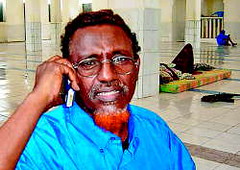
Sheikh Hassan Dahir Aweys, leader of the Consultative Council of the Supreme Islamic Council of Somalia
Originally uploaded by Pan-African News Wire Photo File
11:45 MECCA TIME, 8:45 GMT
Somali leader rejects peace deal
The three-month agreement was expected to come into force in 30 days
Sheikh Hassan Dahir Aweys, former leader of Somalia's Islamic Courts' Union, has rejected a new peace agreement between the country's interim government and its main political rivals.
Aweys, who is a member of the opposition alliance that signed the deal, on Tuesday called it "a trap" to derail armed Somali resistance against Ethiopian forces.
The Ethiopian-backed Somali government and some members of the opposition Alliance for the Liberation of Somalia (ALS) signed a cessation of hostilities accord on Monday at UN-sponsored peace talks in Djibouti.
But the deal faced criticism just hours after it was signed.
Speaking to the Reuters news agency by phone from Eritrea, Aweys said: "We encourage the insurgents and the Somali people not to be tired of combating the enemy."
Earlier, the Somali leader, who holds no formal position in the opposition alliance, told Mogadishu-based Shabelle radio: "I do not believe that the outcome of this conference will have any impact on the resistance in Somalia.
"The aim of the meeting was to derail the holy war in the country."
Agreement terms
The United Nations had announced the terms of the Somali peace deal late on Monday.
Ahmedou Ould-Abdallah, an aide to the UN envoy for Somalia, said: "We have a peace deal."
"They agreed on the termination of all acts of armed confrontation ... to come into force 30 days from the signing of the agreement for an initial period of 90 days, renewable."
Ould-Abdallah said the agreement also called for the UN to authorise deployment of an international stabilisation force.
Within 120 days, Ethiopian forces helping the government fight the Islamic Courts' Union remnant fighters would then leave, conditional on the deployment of sufficient UN troops, he said.
Ban Ki-moon, the UN secretary general, welcomed the agreement and voiced hope that other Somali groups and individuals "will soon adhere to this agreement".
'Arm twisting'
Al Jazeera's Mohammed Adow, reporting from Nairobi, said some of the main sticking points between the two sides seem to have been overcome.
"There is ... [a] meeting to be held in Mecca, Saudi Arabia, on July 30, to discuss all other political issues that are pending," he said.
"They have come back from the brink, and there has been a lot of arm-twisting to come to this point.
"But analysts have pointed out that this does not mean an end to the conflict in Somalia.
"Various groups have splintered, which means there may not be an immediate halt to the conflict."
US strikes
Najum Mushtaq, a Somalia analyst who specialises in the Islamic Courts movement, says that this deal should be taken with a lot of scepticism.
"There are two external factors that I think are very critical," Mushtaq says.
"One is, during the last four and five months we have had US air strikes in Somalia. Although in one of them they have been able to kill a so-called al Qaeda leader … there has been a lot of collateral damage.
"The Islamic insurgency in Somalia should be seen to be directed against two enemies. The Ethiopian occupiers [as the resistance sees them] and the American war against terrorism.
"On both cases this peace deal has little value."
Tense talks
The main sticking point in negotiations has been the presence of predominantly Christian Ethiopian forces on Somali soil - a mostly Muslim country, according to Ould-Abdallah.
He had persuaded teams from both sides to come twice to Djibouti in May and this month. But they declined to meet directly, until Monday's signing ceremony.
Meanwhile, clashes between Muslim fighters and Somali-Ethiopian forces killed at least 28 people over the weekend in Mogadishu.
The fighters are waging a campaign, similar to those in Iraq and Afghanistan, of roadside bombings, ambushes and assassinations.
The violence has triggered a humanitarian crisis that aid workers say may be the worst in Africa, with at least a million people displaced.
Source: Al Jazeera and agencies
No comments:
Post a Comment